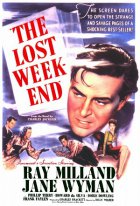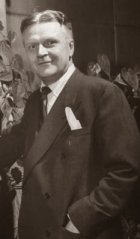
The Lost Weekend Page #15
- NOT RATED
- Year:
- 1945
- 101 min
- 966 Views
Don has entered. Automatically he switches on the light in
the corridor. In a stupor of shame and misery he stumbles
over to the living room couch, flings himself down on it and
lies covering his face with his arms. After a time he brushes
the tears from his eyes with his sleeve and as he does so,
catches sight of something which rivets his attention, brings
a half-crazed smile to his lips.
On the ceiling is the shadow of the bottle which he hid in
the light fixture.
With new strength Don gets to his feet, nervous laughter
shaking him. He pulls the coffee table under the light
fixture, puts the chair on it, climbs up and retrieves his
bottle. He climbs down again, opening the bottle fiercely.
He goes to the table where his empty glass stands, pours it
half full. Over his face as he looks at the glass of whiskey
comes the uplifted peace of a worshipper at the high altar.
There the glass stands, gleaming in the light from above.
Again the CAMERA SLOWLY MOVES TOWARD IT, immerses in its
depths. Oblivion again.
FADE OUT:
SEQUENCE "C"
FADE IN:
C-1 THE BIRNAM APARTMENT - LIVING ROOM
About 9:
30 the next morning. The living room is in the samewild disorder -- books on the floor, a table on the chair
under the ceiling fixture, the couch moved from the wall,
clothes and shoes spilled from the closet. Two empty bottles
and a sticky glass stand about, and the portable, with its
almost virgin sheet of white paper in the roller.
It's a nasty sight, and its nastiness is emphasized by the
sunlight streaming in and mixing with the yellow pallor of
the electric light, forgotten and burning on.
Don is not in sight. Only the telephone, which stands on the
desk next the open portable, is alive. It is ringing at the
top of its bell.
C-2 BIRNAM APARTMENT - BEDROOM
Here reigns the same confusion: the suitcase flung on the
floor, the window shade flapping, and on the unmade bed, not
in it, fully dressed -- shoes, suit, tie -- lies Don, the
comforter and bedspread pulled up over him.
The telephone rings remorselessly. Don opens his eyes slowly.
The brightness of the day stabs them, he shuts them. Again
the telephone.
Don gets up. He is weaker than he thought. Steadying himself
on the bedpost and holding the door frame, he slowly moves
out of the bedroom.
C-3 LIVING ROOM
Don enters. He seems to be going straight to the ringing
telephone, only he isn't. He passes it and goes to the open
window. He puts his arm against the window frame, presses
his forehead against it, stands there, every vibration of
the telephone bell shaking his nerves.
DON:
Stop it, Helen, stop it, stop it.
I'm all right. I just can't talk.
Stop it.
There is another ring and another, then the phone stops.
Don's eyes fall on the bottle and the glass by the big chair.
He moves slowly towards it, picks up the bottle, holds it
upside down over the glass. One slow drop is all it yields.
Don puts down the bottle, goes to the other bottle on the
mantel shelf, picks it up, goes to the kitchen.
C-4 KITCHEN - BIRNAM APARTMENT
In the sink is the bottle Wick emptied that first afternoon.
Don picks it up, goes back into the living room.
C-5 LIVING ROOM - BIRNAM APARTMENT
Don goes to the glass, holds the two bottles upside down
over it. Two more meagre drops emerge, like thick syrup.
They barely stain the bottom of the glass.
Don puts down the two bottles, picks up the glass, empties
the pitiable three drops into the parched desert of his
throat. For a second it seems that he has found some relief.
That's not true. His need for alcohol has been multiplied
tenfold by that mockery of a drink. He's got to get another
bottle, another drink.
What are his finances? Quickly he goes through his pockets.
In the palm of his hand there are exactly two cents. He looks
around the apartment. There on the desk stands the typewriter.
Don walks towards it, rips the sheet of paper from the roller,
slams the lid of the cover shut, picks up the typewriter. It
is heavy, terribly heavy. He drags it to the little hall,
picks up his hat and puts it on.
At the door, weakness overcomes him. Dragging his hand with
it, the typewriter sinks to the floor.
DON:
You'll never make it. You'll never
make that hock shop. It's a block
and a half away.
He is crouched helplessly against the door. At that moment
the telephone shrills again. Once more Don straightens
himself, opens the door and leaves.
C-6 OUTER DOOR - BIRNAM APARTMENT
The note from Helen is still pinned to the door. There are
now two newspapers, two bottles of milk. Don steps over them
carefully, closes the door and starts down the stairs.
DISSOLVE TO:
C-7 EXT. BIRNAM APARTMENT - (SUNNY MORNING)
Mrs. Deveridge and her dog Sophie are outside the apartment
house. Mrs. Deveridge is talking to Dave, the janitor, who
leans on his broom.
Don comes from the house with the typewriter. He stops to
make sure the two are absorbed in conversation, then steps
quickly past them down the street toward Third Avenue. Looking
back to see whether they have seen him, he turns into Third
Avenue and starts uptown.
C-8 THIRD AVENUE
This is to be Don's Via Dolorosa, this black, roaring,
perilous street up which he, drags the hellish weight of
that portable -- that portable which grows heavier with every
step -- in quest of a pawn shop which will give him a few
dollars for it. A few dollars which will mean drink, drink
which he needs to live.
Setting his jaw and whipping on his will, he reaches the
first hock shop. A steel gate is drawn across its entrance.
Don stares at the obstruction, completely mystified. There
is a woman standing nearby, wheeling a baby in a baby
carriage. Don turns to her.
DON:
This isn't Sunday, is it, lady?
WOMAN:
Huh?
DON:
I asked is this Sunday.
WOMAN:
No, Sattaday. Why?
DON:
Because it's closed.
(Looking around)
Nothing else is closed.
WOMAN:
Well, somebody passed away, most
likely.
Don stands helpless for a moment, then, feeling the woman's
intrusive stare, straightens up. In the next block, miles
and miles away for the way he feels, is another pawn shop.
He starts for it.
Again every step is agony. Overhead the elevated thunders
excruciatingly. Sweat pours from his forehead. He changes
the typewriter from one hand to another.
At last he makes the second pawn shop. It too is closed. He
peers through the iron gate into the dark shop, turns around.
Across the street, in the same block, is the third pawn shop.
He must make it, but to get there he must cross the raging
torrent of Third Avenue.
He makes a pillar of the el, leans against it, shaking. When
a trolley car gets out of his way, he continues to cross the
street.
That pawn shop is closed too. Don takes a bar and shakes it.
DON:
What's going on? What is it? Did you
all go to a funeral, all of you?
Maybe it's you that died, Don Birnam.
Maybe it's your funeral.
Translation
Translate and read this script in other languages:
Select another language:
- - Select -
- 简体中文 (Chinese - Simplified)
- 繁體中文 (Chinese - Traditional)
- Español (Spanish)
- Esperanto (Esperanto)
- 日本語 (Japanese)
- Português (Portuguese)
- Deutsch (German)
- العربية (Arabic)
- Français (French)
- Русский (Russian)
- ಕನ್ನಡ (Kannada)
- 한국어 (Korean)
- עברית (Hebrew)
- Gaeilge (Irish)
- Українська (Ukrainian)
- اردو (Urdu)
- Magyar (Hungarian)
- मानक हिन्दी (Hindi)
- Indonesia (Indonesian)
- Italiano (Italian)
- தமிழ் (Tamil)
- Türkçe (Turkish)
- తెలుగు (Telugu)
- ภาษาไทย (Thai)
- Tiếng Việt (Vietnamese)
- Čeština (Czech)
- Polski (Polish)
- Bahasa Indonesia (Indonesian)
- Românește (Romanian)
- Nederlands (Dutch)
- Ελληνικά (Greek)
- Latinum (Latin)
- Svenska (Swedish)
- Dansk (Danish)
- Suomi (Finnish)
- فارسی (Persian)
- ייִדיש (Yiddish)
- հայերեն (Armenian)
- Norsk (Norwegian)
- English (English)
Citation
Use the citation below to add this screenplay to your bibliography:
Style:MLAChicagoAPA
"The Lost Weekend" Scripts.com. STANDS4 LLC, 2024. Web. 26 Dec. 2024. <https://www.scripts.com/script/the_lost_weekend_173>.



Discuss this script with the community:
Report Comment
We're doing our best to make sure our content is useful, accurate and safe.
If by any chance you spot an inappropriate comment while navigating through our website please use this form to let us know, and we'll take care of it shortly.
Attachment
You need to be logged in to favorite.
Log In